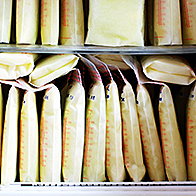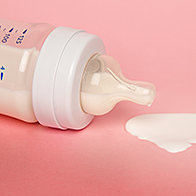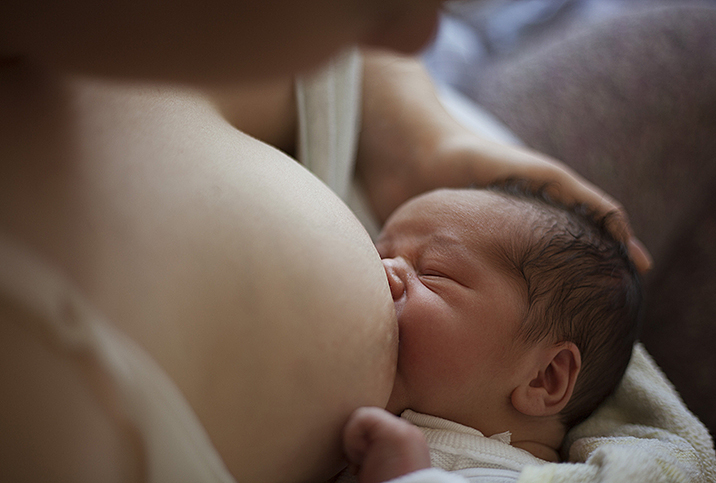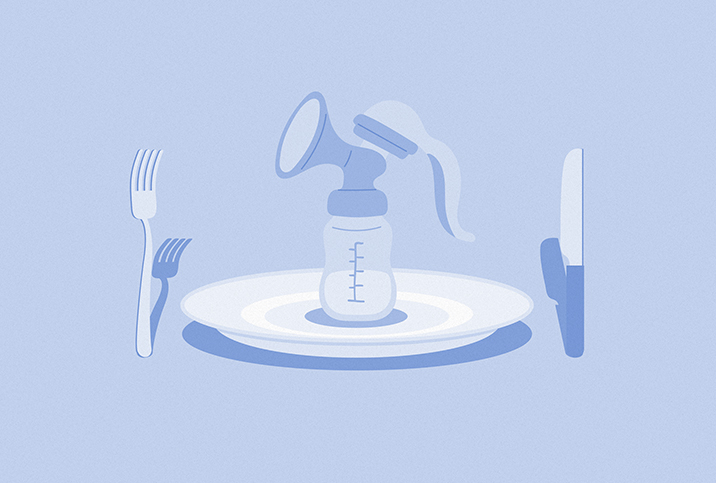Finding the Perfect Breast Pump
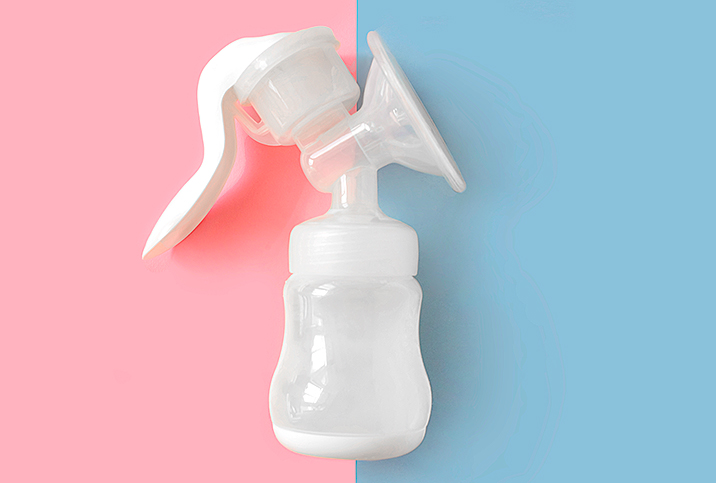
Becoming a new mom is like getting thrown into stormy waters without a raft—you have to learn quickly how to care for this new little life you're cradling in your arms, and it doesn't come with an instruction manual.
One of the biggest and earliest learning curves you'll hit is how to feed your little one. Whether you choose to exclusively breastfeed, pump, formula-feed or some combination of all three, it's a lot to navigate in the early days of motherhood (and for the months that follow).
If you do decide to pump, whether exclusively or as a supplement for other options, navigating the somewhat overwhelming world of breast pumps is a whole other thing you have to try to learn. Here's what you need to consider as you make your decisions.
Remember: Fed is best
The first thing you need to ditch is any "mom guilt" over the feeding decisions you make for your child. As long as your child is eating and growing and getting the nutrients they need for age-appropriate development, you're doing a good job.
So, stop worrying about whether you're doing something "wrong" when it comes to feeding your child.Just remember: Fed is best. And there are lots of reasons (good reasons) you might have for choosing to pump, whether exclusively or as a supplement.
Pumping offers many benefits for mom and baby
"Pumping allows you to continue making milk if you work outside the home or need to travel without your baby in tow. Pumping and bottle-feeding allows a partner or trusted caregiver to participate in feedings and bond with the baby," said Mandy Major, a breastfeeding expert and certified postpartum doula who works with Philips Avent. "There also may be personal reasons making pumping the right choice for you, whether it's for physical reasons or emotional health."
Additionally, pumping is an avenue to give your baby the nutritional benefits of breast milk without having to physically breastfeed every few hours. For anyone who has tried to breastfeed a baby during a growth spurt, it can be a completely overwhelming and physically and emotionally draining experience. Pumping can give you a break, or allow you to stop breastfeeding completely, while still giving your baby the health benefits of breast milk.
For instance, according to Jada Shapiro, a lactation counselor, birth and postpartum doula, and founder of boober, breast milk can help protect your baby from ear infections, respiratory tract infections, diarrhea, necrotizing enterocolitis, allergies, obesity, high blood pressure, Crohn's disease and even leukemia.
'There also may be personal reasons making pumping the right choice for you, whether it's for physical reasons or emotional health.'
"Breast milk contains antibodies that protect against illness, hormones that promote bonding and appetite regulation, stem cells, white blood cells, beneficial bacteria to protect baby's digestive system, prebiotics to support baby's gut health, long-chain fatty acids to help baby's brain and nervous system development, and enzymes that support digestive and immune systems," Shapiro said. "The benefits of pumping breast milk are that your baby can still reap the benefits of your own breast milk even when you're separated from your baby or when nursing is too painful or inefficient."
And you may not realize it, but breastfeeding is a workout for your baby! It takes effort to latch and nurse, and there are instances in which this level of work may be too much for a baby.
"Bottle-feeding breast milk is highly beneficial for premature and late preterm infants who require a more 'passive' feeding style, allowing them to intake calories without having to expend the energy it takes to nurse," Major said. "It's a lot of work for newborns!"
All that is to say, if you make the decision to pump, the extra work it takes and the early learning curve you'll face are worth the effort if it makes other parts of your life easier to handle.
Understanding the two different types of pumps: manual and electric
There are two basic types of breast pumps: manual and electric. Both have their own benefits and drawbacks. Deciding what's best for you really comes down to your lifestyle and needs. "Both types of pumps are useful, and I always encourage new parents to have an electric pump and a manual pump because they can serve different purposes," Major recommended.
Electric pump benefits
If you're pumping exclusively or often, an electric pump is going to be a lifesaver.
"An electric pump is motorized and extracts your milk for you. It's what you'll most likely want for daily pumping because it maximizes your output and is very efficient," Major explained.
This type of pump is often (but not always) available through your insurance company, so make sure you check to see if they provide discounts or reimbursements for pump purchases before you invest.
Shapiro adds that electric pumps allow you to pump without holding parts or requiring you to physically use your own hands to pump. If you're pumping frequently, this means you can go about doing other things while pumping, allowing you to use your time more efficiently.
Manual pump benefits
One of the main benefits of a manual pump is that they're easy to use as needed or when you're on the go. You don't need to think about recharging batteries or being attached to a wall outlet because they're hand-powered. For individuals who pump only occasionally, this can be a much quicker and handier solution than using a full-fledged machine.
"A manual pump is useful for travel, if there's a power outage or if you only need to pump one side," Major said. "It can also be very useful to stave off engorgement—when you want to 'ease off the pressure,' so to speak, but not pump so much that you prompt more milk production."
And, if you happen to have a "strong milk ejection reflex," where your milk spurts out with force when you start to breastfeed, Major said that using a manual pump for a few pumps before you start feeding can help keep your baby from gagging or choking when they start to nurse.
Pumping and milk production: How they work together
Here's the thing about milk production: The more milk you create, the more milk you'll create. In other words, if you're breastfeeding and your baby continuously consumes more milk (which they will—they're growing, after all), you'll start to create more milk. Likewise, if you're pumping in lieu of breastfeeding (or as a supplement to breastfeeding), the more you pump, the more breast milk you'll end up producing.
"More milk out means more milk made," Shapiro said. "Adding in pumping sessions to the amount of nursing you do should increase your milk supply. Manual pumps can be just as effective for some parents. It's more about how often you pump...and how a particular pump works with your body. "
So when you consider pumping (and what type of pump to use), you need to consider how much milk you need or want to produce, how pumping will fit in with your daily nursing or feeding schedule, and what your long-term goals are.
The reality is, pumping is time-consuming. A pumping session usually takes 15 to 30 minutes, and you have to consider the additional time it takes to clean and sanitize your pump after each use.
If you're exclusively breastfeeding but want to pump once or twice a day to start creating a supply of milk for when you'll be away from your baby, a manual pump might be a better choice, as they tend to be less wieldy and easier to clean. If, however, you're replacing breastfeeding with bottle-feeding and want to keep your milk production high, an electric breast pump is likely the way to go because it's more efficient.
Choosing your breast pump
"Not all pumps are created equal," Major said. And more specifically, not all breast pumps are suited for every breast. Breasts themselves are shaped and sized differently, which means that breast pumps that fit one breast well may not fit another breast the same way.
"It's important to find one that fits your needs, as well as your lifestyle," Major explained. "If you're working a full-time paid job, it's likely you'll be pumping upwards of 20-plus hours a month. It's important to use a pump that you want to spend that kind of time with."
Major emphasized that pumping is a very personal journey, and it's important to do your research and to give yourself options (when it's financially possible to do so).
Breasts themselves are shaped and sized differently, which means that breast pumps that fit one breast well may not fit another breast the same way.
"It's important to actively own your decision about which pumps to use," she said. "Research, ask friends what worked or didn't work for them, read reviews, and think about how you'll use that pump—and how you'll use it over time. Your feeding journey will change month-to-month as your baby grows."
If pumping is part of your long-term feeding plan, remember that it's a good idea to have at least one type of manual pump and one type of electric pump to help meet your needs. Think carefully about your wants, needs and long-term plan, and research appropriately.
Any pump used correctly has the ability to provide the milk your baby needs, and the potential to boost supply, but which pump works best for you will depend on your body, your baby and your situation. "The products you use can honestly make or break your postpartum experience," Major said. "As a postpartum doula and mom, I always want folks to use things that make life easier, more comfortable or more manageable day-to-day. Newborn life is tough enough."







